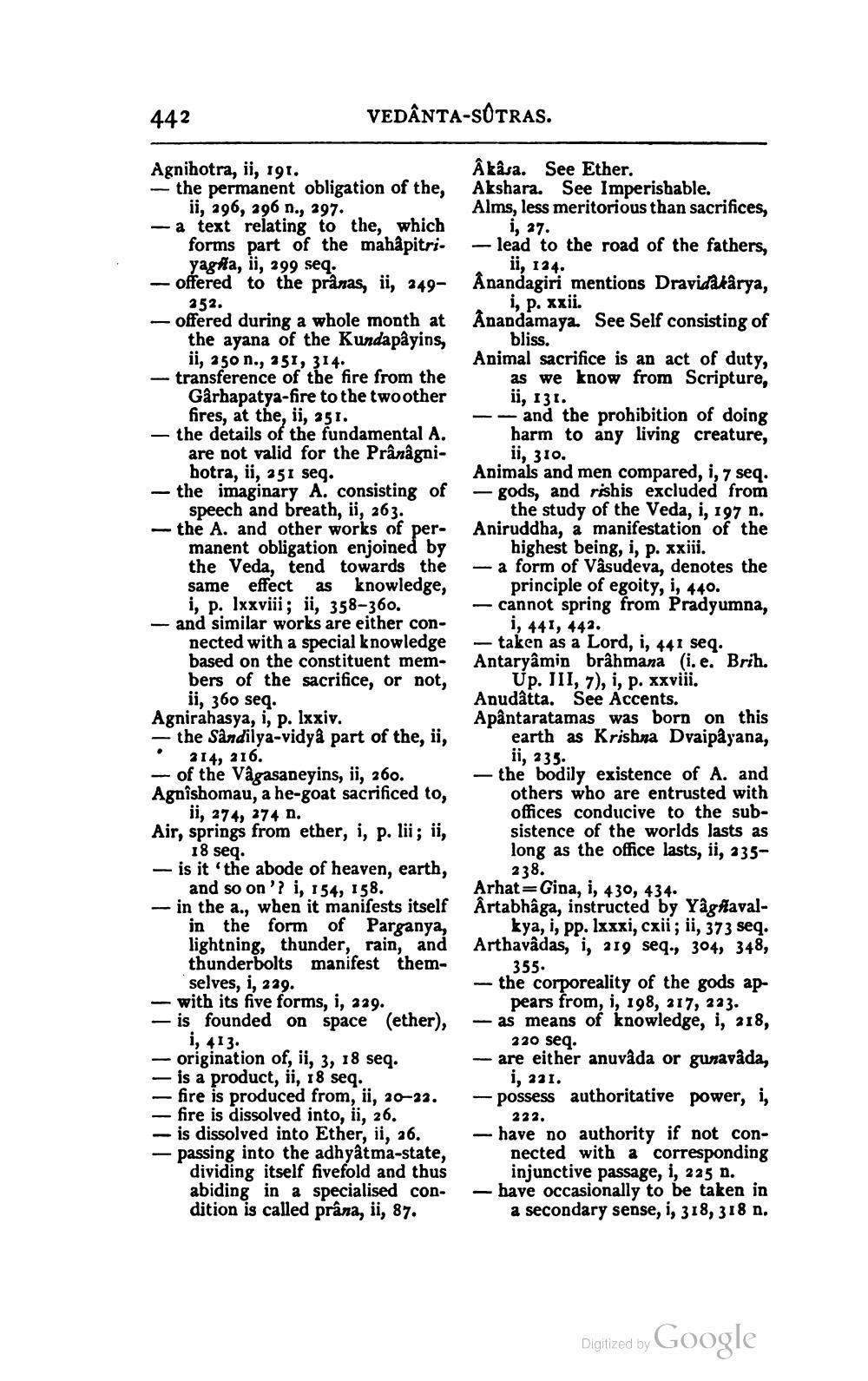________________
442
VEDÂNTA-SOTRAS.
Agnihotra, ii, 191. - the permanent obligation of the,
ii, 296, 296 n., 297. - a text relating to the, which
forms part of the mahậpitri.
yagtta, ii, 299 seq. - offered to the pranas, ii, 249-
252. - offered during a whole month at
the ayana of the Kundapâyins,
ii, 250 n., 251, 314. -transference of the fire from the
Gårbapatya-fire to the two other
fires, at the, ii, 251. - the details of the fundamental A.
are not valid for the Prânâgnihotra, ii, 251 seg. the imaginary A. consisting of
speech and breath, ii, 263. - the A. and other works of per-
manent obligation enjoined by the Veda, tend towards the same effect as knowledge,
i, p. lxxviii; ii, 358-360. -- and similar works are either con
nected with a special knowledge based on the constituent members of the sacrifice, or not,
ii, 360 seq. Agnirahasya, i, p. lxxiv. - the Sandilya-vidyâ part of the, ii, • 214, 216. - of the Vågasaneyins, ii, 260. Agnishomau, a he-goat sacrificed to,
ii, 274, 274 n. Air, springs from ether, i, p. lii; ii,
18 seq. - is it the abode of heaven, earth,
and so on'? i, 154, 158. - in the a., when it manifests itself
in the form of Parganya, lightning, thunder, rain, and thunderbolts manifest them
selves, i, 219. - with its five forms, i, 229. — is founded on space (ether),
i, 413. - origination of, ii, 3, 18 seq. — is a product, ii, 18 seq.
fire is produced from, ii, 20–. - fire is dissolved into, ii, 26. - is dissolved into Ether, ii, 26. passing into the adhyâtma-state,
dividing itself fivefold and thus abiding in a specialised condition is called prâna, ii, 87.
â kâsa. See Ether. Akshara. See Imperishable. Alms, less meritorious than sacrifices,
i, 27. - lead to the road of the fathers,
ii, 124. Anandagiri mentions Dravidakârya,
i, p. xxii. Anandamaya. See Self consisting of
bliss. Animal sacrifice is an act of duty,
as we know from Scripture,
ii, 131. -- and the prohibition of doing
harm to any living creature,
ii, 310. Animals and men compared, i, 7 seq. — gods, and rishis excluded from
the study of the Veda, i, 197 n. Aniruddha, a manifestation of the
highest being, i, p. xxiii. - a form of Vasudeva, denotes the
principle of egoity, i, 440. -- cannot spring from Pradyumna,
i, 441, 442. - taken as a Lord, i, 441 seq. Antaryamin brâhmana (i.e. Brih.
Up. III, 7), i, p. xxviii. Anudatta. See Accents. Apântaratamas was born on this
earth as Krishna Dvaipayana,
ii, 235. - the bodily existence of A. and
others who are entrusted with offices conducive to the subsistence of the worlds lasts as long as the office lasts, ii, 235
238. Arhat=Gina, i, 430, 434. Årtabhaga, instructed by Yagttaval
kya, i, pp. Ixxxi, cxii; ii, 373 seq. Arthavadas, i, 219 seq., 304, 348,
355. - the corporeality of the gods ap
pears from, i, 198, 217, 223. - as means of knowledge, i, 218,
220 seq. -- are either anuvada or guravada,
i, 221. — possess authoritative power, i,
222, - have no authority if not con
nected with a corresponding
injunctive passage, i, 225 n. - have occasionally to be taken in
a secondary sense, i, 318, 318 n.
Digized by Google




